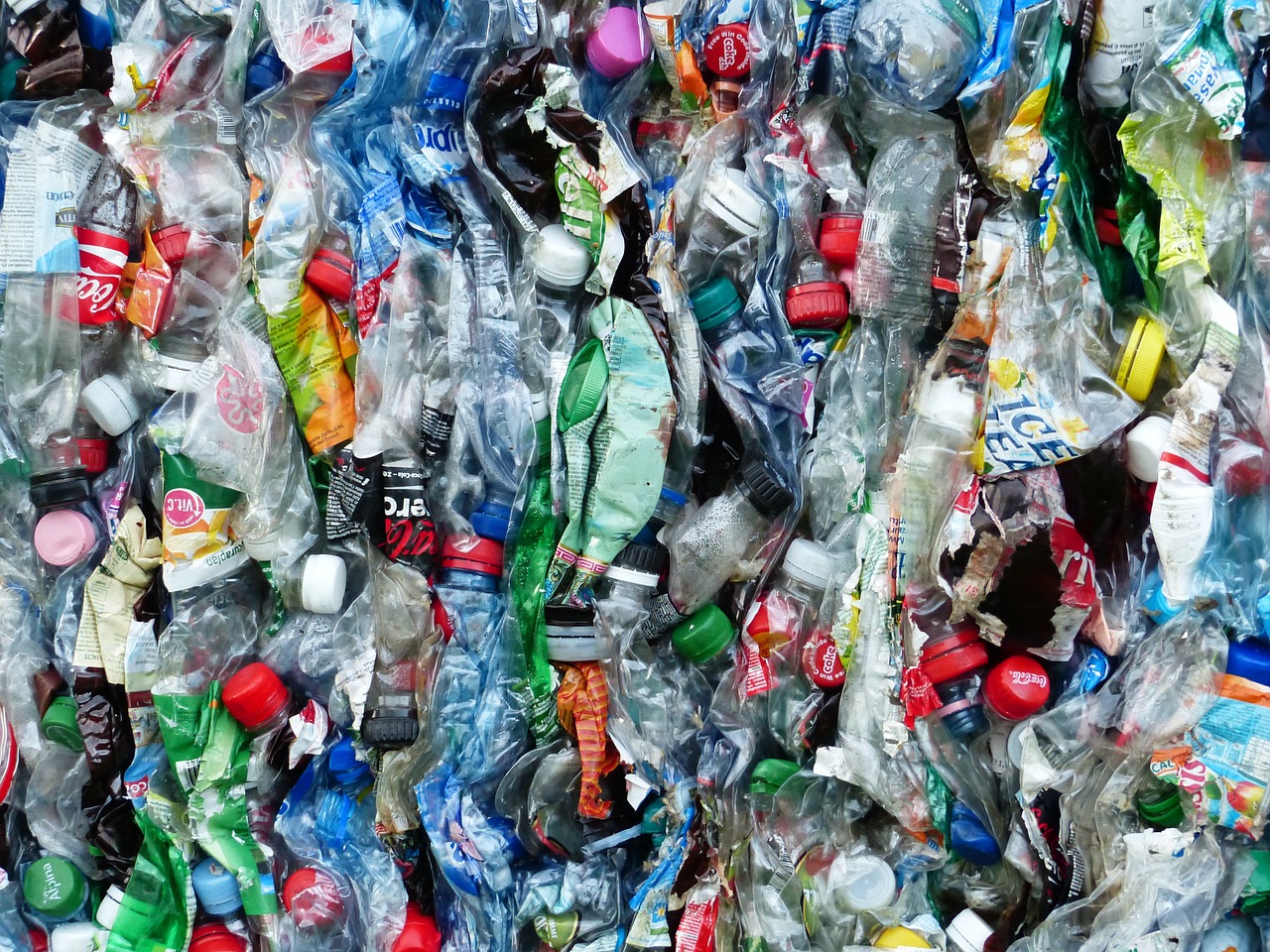Saving the Planet, one plastic bottle at a time
It takes nine-bottles to make a recycled ethical t-shirt. An alarmingly low nine-per cent of the earth's plastic is recycled. Nine seems to be the magic number. So let's get those ghastly bottles out of the endless landfill sites across the world and create a new direction in fashion, the softest fabrics and help preserve our planet.
We all know that recycling is the best way to re-love discarded products. The circular economy is replacing the traditional 'take-make-waste' cycle of creation and consumption. Regenerating the natural environment is the epitome of contemporary clothing design and intentionally refocuses efforts on conscious living. Nature flows in circles; things grow, blossom, die, and return to the soil. In design, the belief is simple – design-out waste, retain products, keep them in use and bypass landfill sites.
So how does new and recycled polyester compare? Virgin polyester is made from ethylene, a derivative of petroleum, coal, air and water. All these irreplaceable products are taken from our planet. Polyester is then formed under intensely high heat. It is an extreme energy process throughout its extraction and production phases. Not only does this practice use vast quantities of natural resources, but the raw materials and by-products are toxic and pollute the water and air, causing several grave health hazards.
Recycled polyester is much kinder on many levels. The beginning of the waste-reduction journey begins by removing single-use plastic bottles from our beautiful national parks in New South Wales or toxic landfill sites that are further afield. From there, the bottles are shredded into flakes that are melted down into pellets. The pellets are extruded into yarn which is then knitted into your soft Ethical Tees fabric and transformed into beautiful ethically printed, organic t-shirts. Creating sustainable t-shirts in this manner uses 50% less energy to produce, reduces carbon emissions by 54% and saves a staggering 27-litres of water. The process cost is similar, so there is no reason why the production of virgin polyester should continue.
You might remember that Sir David Attenborough stole the show at Glastonbury Festival last year when he warmed up for our very own Kylie Minogue. After showing stunning footage from Blue Planet 2, Attenborough's wildlife series that has inspired a sea of change in general attitudes towards plastic pollution. Sir David caused the Pyramid Stage to be silent, and he managed to cause quite a stir as people considered the throwaway polyester clothing that they were wearing. Although this world-recognised festival was single-use plastic bottle free, Everything that we do and wear has to be considered and intentional. Purchasing organic and ethically made t-shirts should be second nature.
According to data collated by the US nonprofit industry body, Textile Exchange, polyester production has increased ten-fold since 1980 to over 50 million tonnes each year. It accounts for over half of all fibre production. We flippantly discard almost 50 million tonnes of clothing each year, of which 75% ends up in landfill or is burned. Quite simply, we have to do better. We are ploughing through oil and energy at an alarming rate of knots, and it is set to increase if we don't make drastic changes.

The entire fashion industry has and continues to embrace the concept of environmentally friendly t-shirts and other recycled plastic bottle clothing lines. Thankfully, it is becoming more common to find recycled plastic tees and other garments in stores around the world. The fabric is now known as PCR (post-consumer resin). Musicians, athletes and TV stars are joining this green movement. During the early stages, it's essential to make supply chains traceable to ensure that the use of recycled materials is accountable and long-lasting.
Ethical Tees has a range of high quality recycled apparel. From custom printed t-shirts, recycled caps, PET hoodies and much more. If you’re looking to make the switch to recycled apparel then get in touch with us.
Ethical Tees also considers the packaging for your ethical t-shirts and reduces your plastic waste by providing biodegradable packing tape and using compostable shipping mailer bags.
Saving the Planet, one plastic bottle at a time
It takes nine-bottles to make a recycled ethical t-shirt. An alarmingly low nine-per cent of the earth's plastic is recycled. Nine seems to be the magic number. So let's get those ghastly bottles out of the endless landfill sites across the world and create a new direction in fashion, the softest fabrics and help preserve our planet.
We all know that recycling is the best way to re-love discarded products. The circular economy is replacing the traditional 'take-make-waste' cycle of creation and consumption. Regenerating the natural environment is the epitome of contemporary clothing design and intentionally refocuses efforts on conscious living. Nature flows in circles; things grow, blossom, die, and return to the soil. In design, the belief is simple – design-out waste, retain products, keep them in use and bypass landfill sites.
So how does new and recycled polyester compare? Virgin polyester is made from ethylene, a derivative of petroleum, coal, air and water. All these irreplaceable products are taken from our planet. Polyester is then formed under intensely high heat. It is an extreme energy process throughout its extraction and production phases. Not only does this practice use vast quantities of natural resources, but the raw materials and by-products are toxic and pollute the water and air, causing several grave health hazards.
Recycled polyester is much kinder on many levels. The beginning of the waste-reduction journey begins by removing single-use plastic bottles from our beautiful national parks in New South Wales or toxic landfill sites that are further afield. From there, the bottles are shredded into flakes that are melted down into pellets. The pellets are extruded into yarn which is then knitted into your soft Ethical Tees fabric and transformed into beautiful ethically printed, organic t-shirts. Creating sustainable t-shirts in this manner uses 50% less energy to produce, reduces carbon emissions by 54% and saves a staggering 27-litres of water. The process cost is similar, so there is no reason why the production of virgin polyester should continue.
You might remember that Sir David Attenborough stole the show at Glastonbury Festival last year when he warmed up for our very own Kylie Minogue. After showing stunning footage from Blue Planet 2, Attenborough's wildlife series that has inspired a sea of change in general attitudes towards plastic pollution. Sir David caused the Pyramid Stage to be silent, and he managed to cause quite a stir as people considered the throwaway polyester clothing that they were wearing. Although this world-recognised festival was single-use plastic bottle free, Everything that we do and wear has to be considered and intentional. Purchasing organic and ethically made t-shirts should be second nature.
According to data collated by the US nonprofit industry body, Textile Exchange, polyester production has increased ten-fold since 1980 to over 50 million tonnes each year. It accounts for over half of all fibre production. We flippantly discard almost 50 million tonnes of clothing each year, of which 75% ends up in landfill or is burned. Quite simply, we have to do better. We are ploughing through oil and energy at an alarming rate of knots, and it is set to increase if we don't make drastic changes.

The entire fashion industry has and continues to embrace the concept of environmentally friendly t-shirts and other recycled plastic bottle clothing lines. Thankfully, it is becoming more common to find recycled plastic tees and other garments in stores around the world. The fabric is now known as PCR (post-consumer resin). Musicians, athletes and TV stars are joining this green movement. During the early stages, it's essential to make supply chains traceable to ensure that the use of recycled materials is accountable and long-lasting.
Ethical Tees has a range of high quality recycled apparel. From custom printed t-shirts, recycled caps, PET hoodies and much more. If you’re looking to make the switch to recycled apparel then get in touch with us.
Ethical Tees also considers the packaging for your ethical t-shirts and reduces your plastic waste by providing biodegradable packing tape and using compostable shipping mailer bags.


Watch how simple it is to create a custom design on Ethical Tees. Have a question? Get in touch with one of our friendly staff!
